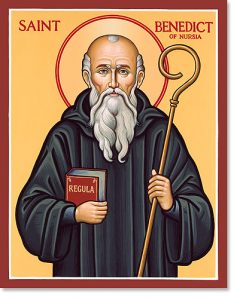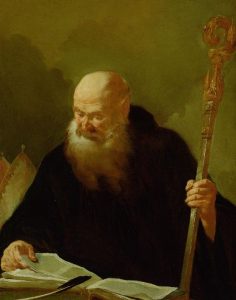Missionary Disciples – Memorial of St. Benedict
(Hosea 10:1-3,7-8,12; Ps 105; Mt 10:1-7)
**************************************************
A Jewish businessman sent his son to Jerusalem to get a good Jewish education, but he came home a Christian. Distraught, he took his problem to the chief rabbi, who told him he too had sent his son to Jerusalem, and he son also came home a Christian. They decided to pray to God for advice, and as they prayed, they heard God say, “Funny you should mention that – I too sent my son to Jerusalem …”
The readings today are all about our identity as the New Israel, called to be missionary disciples, sustained by contemplative prayer.
As of the Covenant on Mt. Sinai, Israel was to be an image of God in the world, a holy nation, a royal priesthood, a people set apart. The first reading is all about the failure and infidelity of the old Israel. Their heart was false; they were guilty. Their religious system had become so corrupt the Shekinah or glory of God lifted up and left the Temple in the time of Ezekiel. They were punished more by their sins than for them. God’s call for them to repent, to sow righteous deeds, to reap steadfast love, and let go of stubbornness (break up the fallow ground) – simply underlines the gravity of their sin, sinfulness and infidelity.
The gospel is all about the establishment of a New Israel by Jesus, the new Moses. Jesus is the Messiah sent to restore the Temple, to gather all the nations, to overcome the enemies of Israel, and to reign as Lord over all creation. This he did through his ministry, death and resurrection.
So now the Messiah is establishing a New Israel. The 12 apostles named replace the 12 tribes of Israel. Jesus gave them authority over the unclean spirits that had troubled the old Israel in the desert. The word authority means to author life. The old Israel failed to author life – instead they succumbed to the old temptations of possessions and pleasure, prestige and fame, power and control that has been the story of humanity since the fall.
Finally, things would be different. The apostles were to go to the lost sheep of the house of Israel, and proclaim the Good News that the Kingdom of God is at hand. They would author life, heal and cast out demons – especially Peter, Stephen and Paul. This was new, different, and exciting. We are part of this new creation, this new thing that God was bringing about, also given authority and called to author life by our lives and ministry as part of this new creation, this New Israel.
Unlike the Old Israel in their infidelity and idolatry, we are to seek the face of the Lord always. In the words of today’s psalm response, we are to seek his presence continually – to live in the house of the Lord all our days. We do so only through the power of the Spirit of the Risen Lord given to the Church, the New Israel, at Pentecost, and through contemplative prayer – grounded in God’s love for us. In the words of today’s psalm response, we are to seek the face of the Lord always.
There is a call here for us to deal with our own demons, to break up our own fallow ground, to be on healing journeys, to let go and heal of our sin, sinfulness, painful emotions, negative attitudes and any addictions. Retreats, prayer, spiritual direction, counseling and therapy if need be, are all part of the mix. In the words of Thomas Keating, “in the deep rest of contemplative prayer, the human body receives permission to evacuate the emotional junk of a lifetime.” In a process he calls Divine Therapy, the Holy Spirit can plumb into the depths of our being much further than any counseling or therapy.
Today the Church honors St. Benedict, who was certainly a missionary disciple. Considered the father of Western monasticism, he was born in Nursia in central Italy circa 480 and died in 547.The little we know of his personal life comes from two documents: The Second Dialogue of Gregory the Great, and the Rule written by Benedict himself. Benedict was educated in Rome, a decadent city. After a few years, convinced God was calling him to be a monk or hermit, Benedict fled to a local village. After a brief stay with some holy men, he decided on a life of solitude. He received the monastic habit at Subiaco, and retired to a cave, where he lived alone in the tradition of the Desert Fathers. Soon, he began to attract followers and built 12 small monasteries.

Between 520 and 530, Benedict and a few companions founded the great monastery of Monte Cassino, where he spent the rest of his life and wrote his Rule. This work became the primary influence on Western religious life for the next 600 years and is still followed by the “daughters and sons” of St. Benedict. This remarkable guide reflected the fatherly concern and charity of Benedict as he adapted the austere rule of the Desert Fathers to community life. He emphasized moderation, humility, obedience, prayer and manual labour as the way of holiness. St. Benedict is considered the Patriarch of Western Monasticism, and was proclaimed patron of Europe in 1964 by Pope Paul VI.

The Eucharist we celebrate now is our New Passover, our new daily manna, for our journey into this new creation.
So, let us pray for the faith to live out our identity as the New Israel of God, authoring new life through our ministry and sustained by contemplative prayer as we seek the face of God always.




We are missionary disciples when we decide,to trust God and follow his ways of teachings. When we transform into being Christians , God has messages for each one of us telling us what to do. Everyone is different and it depends on their situations . We should just believe God and Jesus Christ as the son of God will heal us and transform us into a new beginning. This means accepting this one true God and ready to reconcile for our sins by letting go of the past. All the stubborness, selfish, and greed that has forbid us to face the truth. If we are willing to face the truth and deal with it then we will be healed. We will transform into this new person meet this New Covenant which is Jesus himself. By being this missionary disciple is living out his word and proclaim the Good News to other people. Meet this new life which is waiting for us. Amen . The word of the Lord Thanks be to God.
We should know Jesus’ dignity by celebrating his ministry, passion, death and resurrection by going to mass and receive the communion. The Eucharist is the new Passover and our new daily manna . Jesus is presented in the Eucharist , once we receive it he will be with us . Amen. Amen .
Thanks Bishop Lavoie for this homily and the story about St. Benedict . Many Blessings! Bravo !